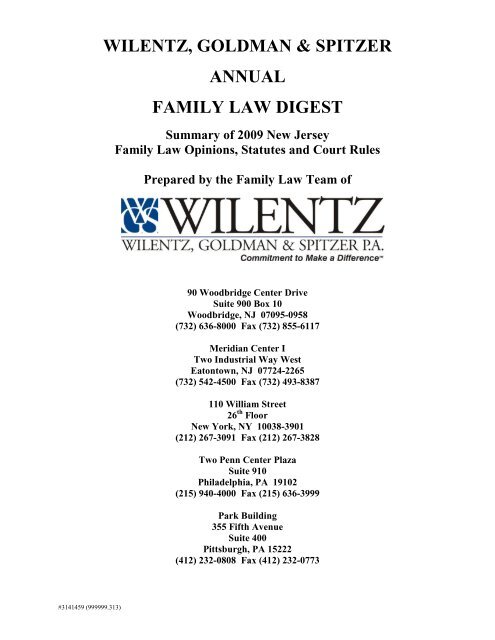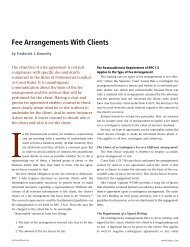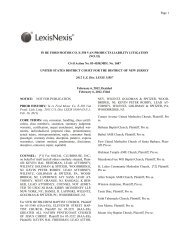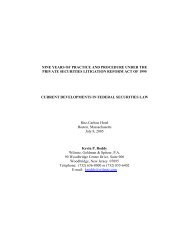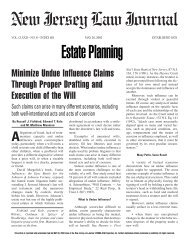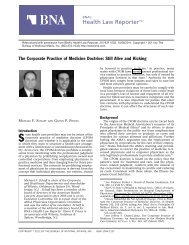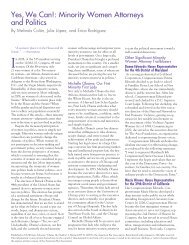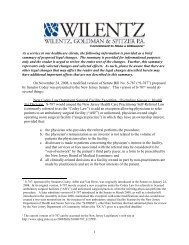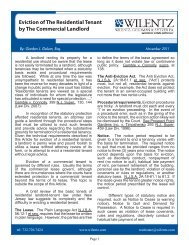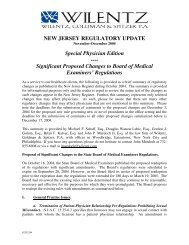Family Law Digest 2009 - Wilentz, Goldman & Spitzer
Family Law Digest 2009 - Wilentz, Goldman & Spitzer
Family Law Digest 2009 - Wilentz, Goldman & Spitzer
You also want an ePaper? Increase the reach of your titles
YUMPU automatically turns print PDFs into web optimized ePapers that Google loves.
WILENTZ, GOLDMAN & SPITZERANNUALFAMILY LAW DIGESTSummary of <strong>2009</strong> New Jersey<strong>Family</strong> <strong>Law</strong> Opinions, Statutes and Court RulesPrepared by the <strong>Family</strong> <strong>Law</strong> Team of90 Woodbridge Center DriveSuite 900 Box 10Woodbridge, NJ 07095-0958(732) 636-8000 Fax (732) 855-6117Meridian Center ITwo Industrial Way WestEatontown, NJ 07724-2265(732) 542-4500 Fax (732) 493-8387110 William Street26 th FloorNew York, NY 10038-3901(212) 267-3091 Fax (212) 267-3828Two Penn Center PlazaSuite 910Philadelphia, PA 19102(215) 940-4000 Fax (215) 636-3999Park Building355 Fifth AvenueSuite 400Pittsburgh, PA 15222(412) 232-0808 Fax (412) 232-0773#3141459 (999999.313)
TABLE OF CONTENTSPAGEARBITRATION .............................................................................................................................1CHANGE IN CIRCUMSTANCES ..............................................................................................3CHILD SUPPORT .........................................................................................................................5CUSTODY ......................................................................................................................................7DOMESTIC VIOLENCE .............................................................................................................8STATUTE OF LIMITATIONS UNDER CHILD SEXUAL ABUSE ACT ...........................10RECUSAL OF JUDGE ...............................................................................................................12JURISDICTION UNDER PARENTAGE ACT ........................................................................12PARENTAL IMMUNITY...........................................................................................................14RIGHTS OF DECEDENT’S ESTATE TO ASSERT EQUITABLE CLAIMS .....................14SPECIFIC PERFORMANCE ....................................................................................................15TAXES ..........................................................................................................................................16THIRD PARTIES ........................................................................................................................17VALUATION ...............................................................................................................................18DIVISION OF YOUTH AND FAMILY SERVICES ...............................................................19ERISA ...........................................................................................................................................24STATUTES ...................................................................................................................................25RULE CHANGES ........................................................................................................................26#3141459 (999999.313)ii
TOPICAL CASE INDEXPAGEARBITRATIONFawzy v. Fawzy,199 N.J. 456 (<strong>2009</strong>) .................................................................................................................... 1Johnson v. Johnson,___ N.J. Super. __ (App. Div. <strong>2009</strong>) .......................................................................................... 2CHANGE IN CIRCUMSTANCESDonnelly v. Donnelly,405 N.J. Super. 117 (App. Div. <strong>2009</strong>) ........................................................................................ 3Gonzalez-Posse v. Ricciardulli,410 N.J. Super. 340 (App. Div. <strong>2009</strong>) ........................................................................................ 4CHILD SUPPORTCentanni v. Centanni,408 N.J. Super. 78 (Ch. Div. 2008) (approved for publication June 8, <strong>2009</strong>) ............................ 5Martin v. Martin,410 N.J. Super. 1 (Ch. Div. <strong>2009</strong>) ............................................................................................. 5Wunsch-Deffler v. Deffler,406 N.J. Super. 505 (Ch. Div. <strong>2009</strong>) .......................................................................................... 6CUSTODYFaucett v. Vasquez,<strong>2009</strong> WL 4877712 (App. Div. <strong>2009</strong>) .......................................................................................... 7DOMESTIC VIOLENCECrespo v. Crespo,408 N.J. Super. 25 (App. Div. <strong>2009</strong>), appeal granted, 200 N.J. 468 (<strong>2009</strong>) ............................... 8J.S. v. J.F.,410 N.J. Super. 611 (App. Div. <strong>2009</strong>) ........................................................................................ 9STATUTE OF LIMITATIONS UNDER CHILD SEXUAL ABUSE ACTR.L. v. Voytac,199 N.J. 285 (<strong>2009</strong>) .................................................................................................................. 10#3141459 (999999.313)iii
RECUSAL OF JUDGEChandok v. Chandok, 406 N.J. Super. 595 (App. Div. <strong>2009</strong>) .................................................... 12JURISDICTION UNDER PARENTAGE ACTC.L. v. W.S.,406 N.J. Super. 484 (App. Div. <strong>2009</strong>) ...................................................................................... 12Pek v. Prots,409 N.J. Super. 358 (Ch. Div. <strong>2009</strong>) ........................................................................................ 13PARENTAL IMMUNITYThorpe v. Wiggan,405 N.J. Super. 68 (App. Div. <strong>2009</strong>) ........................................................................................ 14RIGHTS OF DECENT'S ESTATE TO ASSERT EQUITABLE TABLE CLAIMSKay v. Kay,405 N.J. Super. 278 (App. Div. <strong>2009</strong>) ...................................................................................... 14SPECIFIC PERFORMANCEHouseman v. Dare,405 N.J. Super. 538 (App. Div. <strong>2009</strong>) ...................................................................................... 15TAXESBruen v. Comm. of Internal Revenue,T.C. Memo. <strong>2009</strong>-249, <strong>2009</strong> WL 3617592 (U.S. Tax Ct. <strong>2009</strong>) .............................................. 16THIRD PARTIESSweeney v. Sweeney,405 N.J. Super. 586 (App. Div. <strong>2009</strong>) ...................................................................................... 17VALUATIONPansini Custom Design Assoc., LLC, v. City of Ocean City,407 N.J. Super. 137 (App. Div. <strong>2009</strong>) ...................................................................................... 18DIVISION OF YOUTH AND FAMILY SERVICESDivision of Youth and <strong>Family</strong> Services v. A.P. and F.H.,408 N.J. Super. 252 (App. Div. <strong>2009</strong>) ..................................................................................... 22Division of Youth and <strong>Family</strong> Services v. A.R.,405 N.J. Super. 418 (App. Div. <strong>2009</strong>) ...................................................................................... 18#3141459 (999999.313)iv
Division of Youth and <strong>Family</strong> Services v. G.M.,198 N.J. 382 (<strong>2009</strong>) .................................................................................................................. 19Division of Youth and <strong>Family</strong> Services v. J.L.,410 N.J. Super. 159 (App. Div. <strong>2009</strong>) ...................................................................................... 20Division of Youth and <strong>Family</strong> Services v. P.W.R.,410 N.J. Super. 501 (App. Div. <strong>2009</strong>) ...................................................................................... 21Division of Youth and <strong>Family</strong> Services v. V.M. and B.G.,408 N.J. Super. 222 (App. Div. <strong>2009</strong>) ...................................................................................... 22ERISAKennedy v. Plan Adm'r for DuPont Sav. & Inv. Plan,__ U.S. __, 129 S. Ct. 865, 172 L. Ed. 2d 662 (U.S. <strong>2009</strong>) ...................................................... 23#3141459 (999999.313)v
ALPHABETICAL CASE INDEXPageBruen v. Comm. of Internal Revenue,T.C. Memo. <strong>2009</strong>-249, <strong>2009</strong> WL 3617592 (U.S. Tax Ct. <strong>2009</strong>) .............................................. 16C.L. v. W.S.,406 N.J. Super. 484 (App. Div. <strong>2009</strong>) ...................................................................................... 12Centanni v. Centanni,408 N.J. Super. 78 (Ch. Div. 2008) (approved for publication June 8, <strong>2009</strong>) ............................ 5Chandok v. Chandok,406 N.J. Super. 595 (App. Div. <strong>2009</strong>) ...................................................................................... 12Crespo v. Crespo,408 N.J. Super. 25 (App. Div. <strong>2009</strong>), appeal granted, 200 N.J. 468 (<strong>2009</strong>) ............................... 8Division of Youth and <strong>Family</strong> Services v. A.P. and F.H.,408 N.J. Super. 252 (App. Div. <strong>2009</strong>) ..................................................................................... 22Division of Youth and <strong>Family</strong> Services v. A.R.,405 N.J. Super. 418 (App. Div. <strong>2009</strong>) ...................................................................................... 18Division of Youth and <strong>Family</strong> Services v. G.M.,198 N.J. 382 (<strong>2009</strong>) .................................................................................................................. 19Division of Youth and <strong>Family</strong> Services v. J.L.,410 N.J. Super. 159 (App. Div. <strong>2009</strong>) ...................................................................................... 20Division of Youth and <strong>Family</strong> Services v. P.W.R.,410 N.J. Super. 501 (App. Div. <strong>2009</strong>) ...................................................................................... 21Division of Youth and <strong>Family</strong> Services v. V.M. and B.G.,408 N.J. Super. 222 (App. Div. <strong>2009</strong>) ...................................................................................... 22Donnelly v. Donnelly,405 N.J. Super. 117 (App. Div. <strong>2009</strong>) ........................................................................................ 3Faucett v. Vasquez,<strong>2009</strong> WL 4877712 (App. Div. <strong>2009</strong>) .......................................................................................... 7Fawzy v. Fawzy,199 N.J. 456 (<strong>2009</strong>) .................................................................................................................... 1#3141459 (999999.313)vi
Gonzalez-Posse v. Ricciardulli,410 N.J. Super. 340 (App. Div. <strong>2009</strong>) ........................................................................................ 4Houseman v. Dare,405 N.J. Super. 538 (App. Div. <strong>2009</strong>) ...................................................................................... 15J.S. v. J.F.,410 N.J. Super. 611 (App. Div. <strong>2009</strong>) ........................................................................................ 9Johnson v. Johnson,___ N.J. Super. __ (App. Div. <strong>2009</strong>) .......................................................................................... 2Kay v. Kay,405 N.J. Super. 278 (App. Div. <strong>2009</strong>) ...................................................................................... 14Kennedy v. Plan Adm'r for DuPont Sav. & Inv. Plan,__ U.S. __, 129 S. Ct. 865, 172 L. Ed. 2d 662 (U.S. <strong>2009</strong>) ...................................................... 23Martin v. Martin,410 N.J. Super. 1 (Ch. Div. <strong>2009</strong>) ............................................................................................. 5Pansini Custom Design Assoc., LLC, v. City of Ocean City,407 N.J. Super. 137 (App. Div. <strong>2009</strong>) ...................................................................................... 18Pek v. Prots,409 N.J. Super. 358 (Ch. Div. <strong>2009</strong>) ........................................................................................ 13R.L. v. Voytac,199 N.J. 285 (<strong>2009</strong>) .................................................................................................................. 10Sweeney v. Sweeney,405 N.J. Super. 586 (App. Div. <strong>2009</strong>) ...................................................................................... 17Thorpe v. Wiggan,405 N.J. Super. 68 (App. Div. <strong>2009</strong>) ........................................................................................ 14Wunsch-Deffler v. Deffler,406 N.J. Super. 505 (Ch. Div. <strong>2009</strong>) .......................................................................................... 6#3141459 (999999.313)vii
novo using the “best-interests test.” This hybrid model advances the goals of arbitration, affordsdeference to parental decision making, and leaves open the availability of court interventionwhen necessary to prevent harm to the child.Issue 3: May a guardian ad litem be empowered to serve as an arbitrator?Holding 3: No. A guardian ad litem, who subsequently serves as an arbitrator, may be privy toinformation about which the parties have no knowledge and which has not been presented orbeen subject to cross-examination during the arbitration proceeding. Moreover, a person servingin both roles could be called to testify and could be subject to a claim of partiality under N.J.S.A.2A:23B-23(a).Johnson v. Johnson, ___ N.J. Super. __ (App. Div. <strong>2009</strong>). Before Judges Payne, C.L. Minimanand Waugh. Opinion by Miniman, J.A.D.Issue: Should the rule of law established in Fawzy v. Fawzy, 199 N.J. 456 (<strong>2009</strong>) be appliedretroactively? The rule of law provides that in all child-custody and parenting-time arbitrations, arecord of all documentary evidence be kept, all testimony recorded verbatim, and the arbitratorissue in writing or otherwise record his or her findings of fact and conclusions of law with afocus on the best interests standard.Holding: Yes, if the matter is pending in court and no, if the matter is already decided. Thethree part test to determine whether a new rule of law should be applied retroactively orprospectively support retroactive application of the Fawzy rule. First, the purpose of the rule isto provide parents with the option of arbitrating child-custody and parenting-time issues whileensuring that arbitration does not result in harm to the child, and this purpose will be furthered byretroactive application. Second, because it was clear that the issue in Fawzy was unresolvedunder New Jersey law, no degree of reliance could have been placed on an “old rule.” Third, theadministration of justice will not be hampered by application of pipeline retroactivity rather than#3141459 (999999.313)2
full retroactivity. Full retroactivity would inundate the courts with motions for vacation ofarbitration awards. Pipeline retroactivity is appropriate so that previous awards will not bedisturbed but currently litigating parties will have the benefit of the Fawzy decision. Last,Fawzy is not distinguishable from the instant case despite the fact that the parties agreed toproceed under the Alternative Procedure for Dispute Resolution Act, N.J.S.A. 2A:23A-1 to -30,rather than the Arbitration Act, N.J.S.A. 2A:23B-1 to -32.CHANGE IN CIRCUMSTANCESDonnelly v. Donnelly, 405 N.J. Super. 117 (App. Div. <strong>2009</strong>). Before Judges Fisher, C.L.Miniman, and Baxter. Opinion by Fisher, J.A.D.Issue: Did the trial court abuse its discretion in denying the payor’s request for a reduction inalimony and child support without a hearing when it held a plenary hearing addressing the sameissue one year earlier?Holding: No. The Appellate Division held that the trial judge was correct in his determinationthat the payor had returned to court too soon. Despite the payor’s assertions that his law practicewas dwindling, the court concluded that the payor continued to take on greater debt and live alavish lifestyle. The findings made by the trial court a year earlier were entitled to weight in thetrial court and deference by the Appellate Court because the payor never challenged the decisionwith an appeal. Instead, payor filed a second Lepis application nine months after the Courtdenied his initial application after discovery and a full hearing.The Appellate Division concurred with the trial court in that a reduction in income is onlyone part of the calculus. The payor continued to live a lavish lifestyle, inconsistent with areduction in income.Since payor failed to make a prima facie showing of changedcircumstances, the trial court was not required to hold a hearing and payee was not required tosubmit a Case Information Statement.#3141459 (999999.313)3
In affirming, the appellate division noted: “There is, of course, no brightline rule bywhich to measure when a changed circumstance has endured long enough to warrant amodification of a support obligation.Instead, such matters turn on the discretionarydeterminations of <strong>Family</strong> Part judges, based upon their experience as applied to all the relevantcircumstances presented, which we do not disturb absent an abuse of discretion.”Gonzalez-Posse v. Ricciardulli, 410 N.J. Super. 340 (App. Div. <strong>2009</strong>). Before JudgesCarchman, Parrillo and Ashrafi. Opinion by Parrillo, J.A.D.Issue 1: Having found that an involuntary and substantial change in circumstances occurredwarranting a modification of husband’s alimony obligation, did the trial court err by“restructuring” a five year limited duration alimony award of $500.00 per week into a seventeenyear alimony obligation of $100.00 per week due to “unusual circumstances”.Holding: Yes. The trial court’s alimony modification contravened the specific need for, andpurpose of, the limited duration alimony award in the parties’ Property Settlement Agreement.The trial court’s decision was unsupported by any articulated, sustainable reasons, much less“unusual circumstances”. Moreover, it miscalculated the supported spouse’s increase in incomeand the payor’s legitimate living expenses. The trial court also failed to articulate why theheightened statutory standard of “unusual circumstances” had been satisfied and why the intentof the original divorce decree could not be fulfilled.Following a thirteen day hearing, the trial court properly concluded that a change ofcircumstance had occurred after the husband’s income was reduced from $150,000.00 US dollarsto $27,000.00 US dollars after he was terminated by his employer in New Jersey andinvoluntarily removed from the country upon the expiration of his visa. In modifying thealimony award, however, the trial court failed to apply the governing standard that is identical tothat which is applied at the time of the divorce: “the dependent spouse’s needs, that spouse’s#3141459 (999999.313)4
ability to contribute to the fulfillment of those needs, and the supporting spouse’s ability tomaintain the dependant spouse at the former standard.” Citing Lepis v. Lepis, 83 N.J. 139, 152(1980).CHILD SUPPORTCentanni v. Centanni, 408 N.J. Super. 78 (Ch. Div. 2008) (approved for publication June 8,<strong>2009</strong>). Opinion by McGann, J.S.C.Issue: Can an obligor retroactively amend child support to the date of death of one of the parties’children?Holding: Yes. N.J.S.A. 2A:17-56.23(a) does not bar the modification of child supportretroactive to the date of death of one of the parties’ children. Nothing within the four corners ofthe statute evinces intent on the part of the Legislature to bar retroactive modification upon suchan occurrence. Moreover, to bar retroactive modification would be to punish financially anobligor who has thoughtfully, and in good faith, allowed an appropriate period of grieving andhealing to take place before seeking redress in court. A bar on retroactive modifications wouldencourage an earlier filing while families are still in the midst of coping with the tragedy.Martin v. Martin, 410 N.J. Super. 1 (Ch. Div. <strong>2009</strong>). Opinion by Hass, J.S.C.Issue: Are child support orders subject to a triennial review by a court, regardless of whetherthere has been a change of circumstances?Holding: No. Rule 5:6B (adopted by the New Jersey Supreme Court on July 10, 1998 andeffective September 1, 1998) provides that all child support orders entered, modified or enforcedare automatically adjusted every two years, subject to exceptions, to reflect a cost of livingadjustment (“COLA”) based upon the consumer price index.Rule 5:6B, when read inconjunction with N.J.S.A. 2A:17-56.9a, eliminates the automatic triennial review that governedchild support orders prior to September 1, 1998.#3141459 (999999.313)5
Both parties do have the right to contest the automatic COLA every two years prior to theentry of the adjustment. The procedure is that both parties are provided with notice of theproposed adjustment and the opportunity to consent or object to same within thirty days. Aparty’s objection to the adjustment are limited to the following: (a) where an obligor’s incomehas not increased at a rate at least equal to the rate of inflation; or (b) where the order itselfprovides for an alternative periodic COLA.Aside from the automatic COLA and the parties’ right to contest same, the court may notreview a child support order absent a party establishing that a modification is warranted basedupon a change of circumstances mandated by Lepis. The misconceived notion of a right to havea child support order reviewed every three years stems from the trial court’s holding in Doring v.Doring, 285 N.J. Super. 369 (Ch. Div. 1995). The Doring decision, however, was based uponthe pre-1998 amendment version of N.J.S.A. 2A:17-56.9a. Since the amendment to the statutewent into effect on September 1, 1998, “[t]he mere passage of time since the entry of the childsupport order is not a sufficient reason to request that a court review the order or require that theparties exchange financial information.”Wunsch-Deffler v. Deffler, 406 N.J. Super. 505 (Ch. Div. <strong>2009</strong>). Opinion by Haas, J.S.C.Issue: How should the Court adjust the child support guidelines when the parenting time is splitbetween the parents equally?Holding: Because the Guidelines assume that the “Controlled Expenses” (i.e., clothing, personalcare items, entertainment, etc.) are only incurred by the parent of primary residence, theGuidelines apportion these expenses based upon the parent’s income and not on the time spentwith the child. In a situation where the child spends equal time with both parents, both parentsincur “Controlled Expenses.” Therefore, the “Controlled Expenses” must be “backed out” of thechild support calculation. In order to do this one should first multiply the basic child support#3141459 (999999.313)6
amount determined by the Child Support Guidelines Shared Parenting Worksheet by the payor’sincome share. Then multiply this figure by 25% (the percentage of the child support attributableto “Controlled Expenses”). Third, subtract that figure by the payor’s “Adjusted Basic CSAmount.” The result of these three calculations is the payor’s child support obligation.CUSTODYFaucett v. Vasquez, <strong>2009</strong> WL 4877712 (App. Div. <strong>2009</strong>). Before Judges Grall, Messano andLeWinn. Opinion by Messano, J.A.D.Issue 1: Whether a non-custodial parent seeking modification of a custody order bears thethreshold burden of establishing “changed circumstances that affect the welfare of the child”when the parent of primary residence (“PPR”) is a member of the United States Military who isabout to be deployed for a year away from home?Holding: Yes. The PPR’s deployment alone does not entitle the moving party to a parentalpresumption that modification is warranted without a plenary hearing. The moving party mustbe fit and establish that the PPR is facing deployment for more than a year to demonstrate aprima facie case to warrant a plenary hearing to determine whether the child’s “best interests”are served by temporarily modifying the existing custody order. Impending deployment to themilitary service is a prima facie change in circumstances.By way of background, the parent of primary residence in this case was about to bedeployed for a year and intended to leave the parties’ child in the care of his new spouse. Thebiological mother filed an emergent application seeking an immediate transfer of custody in lightof the plaintiff’s deployment. The deployed custodian argued that it would be a violation ofpublic policy if his deployment resulted in a negative impact on his custodial rights as it woulddiscourage military personal from active service. The court, by way of dicta, suggested thatlegislation would be helpful on this issue. The Appellate Division further noted that a transfer of#3141459 (999999.313)7
permanent custody would be unfair to the parent returning from deployment as he or she wouldthen have the burden of demonstrating another change of circumstances warranting modification.The Court acknowledged that this opinion would not be the last word on this subject.DOMESTIC VIOLENCECrespo v. Crespo, 408 N.J. Super. 25 (App. Div. <strong>2009</strong>), appeal granted, 200 N.J. 468 (<strong>2009</strong>).Before Judges Fisher, C.L. Miniman, and Baxter. Opinion by Fisher, J.A.D.Issue 1: Is the Prevention of Domestic Violence Act (the Act) unconstitutional due to the Act’s“practice and procedure” components as a violation of the separation of powers doctrine?Holding 1: No. The Act’s practice and procedure components (The Domestic Violence Manualof Procedure) do not violate the separation of powers doctrine. The Act has not usurped theSupreme Court’s constitutional authority over the practice and procedures utilized in the Courts.The Supreme Court has adopted Rule 5:7A and has participated with the Attorney General in thecreation of a Domestic Violence Manual incorporating the procedures contained in the Act.Issue 2: Does the Act’s preponderance standard of proof violate due process of law under theConstitution?Holding 2: No. The Act’s preponderance standard of proof does not violate the due processclause. Applying the balancing test established in Matthews v. Eldridge, 424 U.S. 319 (1976),the court concluded that the Act met constitutional muster in line with the Appellate Division’sholding in Roe v. Roe, 253 N.J. Super. 418 (App. Div. 1992). The court reasoned that thedefendant’s private interests carry far less weight than the governmental interest in eliminatingdomestic violence and in affording immediate and effective protection to victims of domesticviolence. In addition, given the private nature of domestic violence acts where most cases turnon the trial judge’s assessment of the credibility of plaintiff and defendant, a standard moredemanding than the preponderance standard would undermine the social purposes of the Act.#3141459 (999999.313)8
Issue 3: By allowing the seizure of defendant’s firearms upon a finding of domestic violence,does the Act violate an individual’s Second Amendment right to bear arms?Holding 3: No. The Second Amendment has no application to the states. Even if the SecondAmendment did apply to the states, the right to bear arms is not without limitation. The Act’sprohibition on the possession of firearms by a person found to have committed domestic violenceis a valid, appropriate and sensible limitation on an individual’s Second Amendment rights.Issue 4: Does the Act’s requirement that a final hearing be held within 10 days of the filing ofcomplaint deprive a defendant of due process?Holding 4: No. The New Jersey Supreme Court in H.E.S. v. J.C.S., 175 N.J. 309 (2003), hasalready held that the ten-day provision comports with due process requirements.Issue 5: Was defendant prejudiced by his inability to depose plaintiff or obtain other discovery?Holding 5: No. Defendant never sought leave to obtain discovery and thus was not prejudiced.The Appellate Division noted its approval of the opinion in Depos v. Depos, 307 N.J. Super. 396(Ch. Div. 1997), in which the court held that a trial judge may in the exercise of sound discretionpermit limited discovery to prevent an injustice.Issue 6: Does a right to counsel exist in domestic violence matters?Holding 6: This question remains unresolved by the courts. Because defendant did not seek theappointment of counsel at the trial level, the issue is purely academic and will not be resolved.Issue 7: Was defendant entitled to a trial by jury?Holding 7: No. The right to trial by jury is constitutionally required only if expressly permittedby the Legislature or if the right existed at common law when the constitution was adopted. Atcommon law, actions at law required a jury trial whereas actions in equity do not require a jury.When the alleged victim of domestic violence chiefly seeks a restraining order, which is anequitable remedy, there is no right to a jury trial.#3141459 (999999.313)9
Holding: Yes. Pursuant to the Child Sexual Abuse Act, a trial court must first determine whena reasonable person subjected to childhood sexual abuse would discover that the defendant'sconduct caused him or her injury (Accrual - an objective test). If that period is more than twoyears prior to the filing of the complaint, then the court must next determine whether the statuteshould be tolled because of "the plaintiff's mental state, duress by the defendant, or any otherequitable grounds." (Tolling – a “highly” subjective test).Under the objective test for Accrual, the plain words of the Act identify two events that mustoccur before a cause of action may accrue: the “reasonable discovery” of both (1) the existenceof injury and (2) the causal relationship of that injury to the acts of sexual abuse. This twoprongedapproach was established “[b]ecause of the unique nature of sexual abuse, which mayonly be discovered by an adult victim after years of repression.” Among the many factors acourt may consider in evaluating the reasonableness of plaintiff’s claim are: the age at the timethe sexual abuse occurred; any threats the wrongdoer may have made to the plaintiff; the lengthof time that passed between the end of the abuse and the emergence of injuries; the nature of theinjuries; the difficulty in discovering certain injuries; and whether the delay may “havepeculiarly or unusually prejudiced defendant.”The court found that the “flashback incident” suffered by the plaintiff may have been themoment his cause of action accrued. If the trial court determines that this is not the date ofaccrual under the above-stated standard, then his later conversation with a co-worker wouldserve as the “outside date” for the accrual of the cause of action. The case was remanded to trialcourt for re-determination of this issue.Under the subjective tolling analysis the court found that it was intended as a “highly” subjectiveinquiry and that a complete examination of the plaintiff’s individual characteristics, that may#3141459 (999999.313)11
have rendered him “uniquely vulnerable,” is appropriate. However, the court held defendant’sstatement that it “might not be a good idea to tell anyone,” did not constitute duress.RECUSAL OF JUDGEChandok v. Chandok, 406 N.J. Super. 595 (App. Div. <strong>2009</strong>). Before Judges Stern, Waugh, andAshrafi. Opinion by Stern, P.J.A.D.Issue: Did the Judge err in failing to recuse himself when he had previously been partners in alaw firm with the defendant’s trial attorney, the break up of which, resulted in acrimoniouslitigation between the Judge and the attorney?Holding: Yes. The prior litigation included charges of assault and unethical conduct, whichgave rise to more than a reasonable belief by an objectively reasonable litigant that the Judgecould not be fair and impartial. Because of the Judge’s error in failing to recuse himself, thecourt reversed and remanded for a new trial without reaching the merits of the divorce judgment.JURISDICTION UNDER PARENTAGE ACTC.L. v. W.S., 406 N.J. Super. 484 (App. Div. <strong>2009</strong>). Before Judges Skillman, Graves and Grall.Opinion by Skillman, P.J.A.D.Issue 1: Does New Jersey have personal jurisdiction over a defendant who impregnated plaintiffin New Jersey in 1986 and had other substantial contacts with New Jersey around that time withrespect to plaintiff’s claims for declaration of paternity and child support under the ParentageAct, N.J.S.A. 9:17-38 to -59?Holding 1: Yes. The Parentage Act’s long-arm jurisdiction provision specifically provides that“[a} person who has sexual intercourse in this State thereby submits to the jurisdiction of thecourts of this State as to an action brought under this act with respect to a child who may have#3141459 (999999.313)12
een conceived by that act of intercourse.” N.J.S.A. 9:17-46(b). Likewise, the UniformInterstate <strong>Family</strong> Support Act’s long-arm jurisdiction provision provides that a court of this statehas jurisdiction in a proceeding to determine parentage if “the individual engaged in sexualintercourse in this State and the child may have been conceived by that act of intercourse.”N.J.S.A. 2A:4-30.68(f). This case is a matter of “specific” jurisdiction because the claim relatesdirectly to the Defendant’s acts within the state.The court determined that defendant’ssubstantial contacts with New Jersey established that defendant “purposefully availed himself ofthe privilege of engaging in sexual activities within New Jersey and that he should reasonablyhave anticipated being haled into court in New Jersey to respond to a claim for a declaration ofpaternity and support if those activities resulted in the conception of a child.”Issue 2: Does the appointment of plaintiff as the guardian ad litem for the child violate thePaternity Act?Holding 2: Yes. The Act specifically provides that “[t]he child’s mother or father may notrepresent the child as guardian or otherwise.” N.J.S.A. 9:17-47.Issue 3: Did the court err by granting retroactive child support where the complaint did not seekthis form of relief?Holding 3: Yes. Although a motion sought this relief, the primary focus of the case dealt withjurisdictional issues and the payor may not have appreciated the magnitude of this issue.Pek v. Prots, 409 N.J. Super. 358 (Ch. Div. <strong>2009</strong>). Opinion by Mega, J.S.C.Issue:Is the continuing exclusive jurisdiction of spousal support overridden by a forumselectionclause provision contained in a property settlement agreement?Holding: No. The forum-selection clause is in violation of the Uniform Interstate <strong>Family</strong>Support Act which confers continuing exclusive jurisdiction to the court issuing the initialspousal support order. Also, to allow the forum-selection clause would be contradictory to#3141459 (999999.313)13
public policy. Enforcing the clause would create a “black-hole” where all states that mayexercise jurisdiction over a matter decline based on the belief that a differing jurisdiction is bettersuited to exercise jurisdiction, leaving litigants without a forum to address a dispute.PARENTAL IMMUNITYThorpe v. Wiggan, 405 N.J. Super. 68 (App. Div. <strong>2009</strong>). Before Judges Carchman, R.B.Coleman and Simonelli. Opinion by Simonelli, J.A.D.Issue: When a father is sued in a wrongful death action, is the decision to leave a child in asmoky car, where he burned to death, protected by parental immunity?Holding: No. Parental immunity protects only conduct that reflects a legitimate child-rearingdecision.Legitimate child-rearing decisions include customary child care, discipline andsupervision. The defendant’s decision to leave his son in the smoky car while he determinedwhat was wrong with the vehicle was not connected to “any unique philosophy of child-rearing,nor was it designed to promote [the child’s] physical, moral, emotional, and intellectual growth.”Therefore, this matter was remanded to determine whether the defendant was negligent in hisdecision to leave the child in the car.RIGHTS OF DECEDENT’S ESTATE TO ASSERT EQUITABLE CLAIMSKay v. Kay, 405 N.J. Super. 278 (App. Div. <strong>2009</strong>). Before Judges Skillman, Graves and Grall.Opinion by Grall, J.A.D.Issue: Did the trial court err when it denied the estate leave to substitute for defendant and fileamended pleadings?#3141459 (999999.313)14
Holding: Yes. The defendant died during the pendency of the divorce action and the estatesought a constructive trust. The trial court held that pursuant to Carr v. Carr, 120 N.J. 336(1990), and Krudzlo v. Krudzlo, 251 N.J. Super. 70 (Ch. Div. 1990), the estate, unlike asurviving spouse, “is not entitled to assert equitable claims against the marital estate sounding inconstructive trust, resulting trust, quasi-contract or unjust enrichment.”The Appellate Division discussed Carr in holding that the <strong>Family</strong> Part must consider theequities arising from the facts of each case to determine whether the estate may “assert equitableclaims against the marital estate sounding in constructive trust, resulting trust, quasi-contract orunjust enrichment.” In the instant matter, the surviving spouse had diverted marital assets intoaccounts in her name and her daughter’s name with the intent to deprive her husband. TheAppellate Division noted that prohibiting the trial court from imposing an equitable remedycould encourage spouses to treat each other unfairly. An estate justly retains the marital propertybeneficially belonging to the decedent spouse, and because there is no remedy at law, the courtsmay exercise their equitable powers with a constructive trust. A constructive trust would addressthe alleged fraud by the surviving spouse and prevent unjust enrichment. The panel deferred tothe trial court on remand as to whether this matter should be heard in the <strong>Family</strong> Part or in theGeneral Equity Division.SPECIFIC PERFORMANCEHouseman v. Dare, 405 N.J. Super. 538 (App. Div. <strong>2009</strong>). Before Judges Skillman, Graves andGrall. Opinion by Grall, J.A.D.Issue: Is specific performance an available remedy to a breach of an oral agreement aboutpossession of a pet?#3141459 (999999.313)15
Holding: Yes. Specific performance is an available remedy when money damages are notadequate to protect the injured party. Specific performance is generally an appropriate remedywhen an agreement concerns property that has strong sentimental value. The panel noted that “ina different context, this court has recognized that pets have special “subjective value” to theirowners.” The Appellate Division found that although plaintiff had stipulated to the value of thedog, that could not be viewed as a concession that the value was adequate to compensate her forher loss of the dog. Moreover, because the trial court ruled prior to the hearing that pets lack theunique value essential to an award of specific performance, defendant did not have a reason oropportunity to present evidence regarding the alleged agreement between the parties.The Appellate Division held that the trial court erred by declining to consider therelevance of an alleged oral agreement and remanded for a plenary hearing to determine whetherthe parties had in fact reached an agreement concerning the pet. The Appellate Division held thatagreements about property jointly held by cohabitants are material in actions concerning itsdivision, and that such agreement may be specifically enforced when that remedy is appropriate.TAXESBruen v. Comm. of Internal Revenue, T.C. Memo. <strong>2009</strong>-249, <strong>2009</strong> WL 3617592 (U.S. Tax Ct.<strong>2009</strong>). Opinion by Gustafson, J.Issue: Is the wife entitled to innocent spouse relief under 26 U.S.C. § 6015(f) from joint taxliability where the Court entered an order in the <strong>Family</strong> Part requiring that each party beresponsible for half of the joint tax liability?Holding: Yes. The wife is entitled to innocent spouse relief as to half of the parties’ joint taxliability that the family court ordered her former husband to pay. The wife is also entitled toinnocent spouse relief as to half of the parties’ joint tax liability for the previous year because itis reasonable to assume that the family court would have ordered the parties’ to share that tax#3141459 (999999.313)16
liability equally if it had known of the liability. Once a spouse has met the threshold eligibilityconditions, an “innocent spouse” must meet three conditions under Revenue Procedure 2003-61,section 4.02: (1) the spouse must no longer be married to, be legally separated from, or have notbeen a member of the same household as the nonrequesting spouse at any time during the 12-month period ending on the date of the request for relief; (2) the spouse must have had noknowledge or reason to know when the return was signed that the nonrequesting spouse wouldnot pay the tax liability; and (3) the spouse must suffer economic hardship if relief is not granted.Other factors to consider are whether the non-requesting spouse abused the requesting spouseand whether the requesting spouse was in poor mental or physical health when the tax return wassigned or at the time relief was requested.THIRD PARTIESSweeney v. Sweeney, 405 N.J. Super. 586 (App. Div. <strong>2009</strong>). Before Judges R.B. Coleman,Sabatino and Simonelli. Opinion by R.B. Coleman, J.A.D.Issue 1: Is a party to a divorce precluded from suing a third party under the entire controversydoctrine if the third party’s agent was a party to the divorce?Holding 1: No. Although the entire controversy doctrine does apply to <strong>Family</strong> Part actions, the“polestar of the application of the rule is judicial fairness.” In this case, the third party was not aparty to the divorce proceeding, no issues concerning the contractual relationship were raisedduring the divorce, and the claims against the third party did not arise out of the maritalrelationship.Even though plaintiff’s ex-husband personally managed the accounts as anemployee of the third party brokerage house, that does not alter the fact that the claims assertedby plaintiff arise under the agreement with the third party.Issue 2: Does a release of a spouse in a divorce proceeding release the spouse’s employer fromits independent contractual obligations?#3141459 (999999.313)17
Holding 2: No. The releases in a divorce proceeding are personal to the divorcing parties anddo not benefit parties in privity to the divorcing parties. The court determined that the effect ofany release on a third party should be determined by the intent of the party giving the release andthe consideration received. In this situation, the releases were clearly not intended to release anyseparate contractual obligations.Issue 3: Is a party to a divorce precluded from suing a third party pursuant to the collateralestoppel doctrine if the third party’s agent was a party to the divorce?Holding 3: No. Collateral estoppel does not preclude the plaintiff from suing a third partywhose agent was a party to the divorce. The issue of whether the brokerage house mishandledthe plaintiff’s accounts was not raised, stipulated or adjudicated in the divorce proceeding. Thecourt found that there was no evidence that the issues had been litigated in any manner in a prioraction.VALUATIONPansini Custom Design Assoc., LLC, v. City of Ocean City, 407 N.J. Super. 137 (App. Div.<strong>2009</strong>). Before Judges Carchman, Sabatino and Simonelli. Opinion by Carchman, P.J.A.D.Issue: Does the use of averaging of comparable sales by the trial judge in fixing the fair marketvalue of the real property in issue, represent an appropriate evaluation methodology, therebyfulfilling a judge’s fact-finding responsibility?Holding: No. Averaging reduces the judge’s fact-finding responsibility to a simplemathematical formula that if adopted will generate appraisals that will intentionally distort andskew the values to insure a high or low number. Instead, the fact finder must resolve the issuewith a careful analysis of the data that may result in the adoption of one appraisal figure overanother.#3141459 (999999.313)18
DIVISION OF YOUTH AND FAMILY SERVICESDivision of Youth and <strong>Family</strong> Services v. A.R., 405 N.J. Super. 418 (App. Div. <strong>2009</strong>). BeforeJudges Stern, Waugh and Newman. Opinion by Stern, P.J.A.D.Issue: Is a comparative bonding evaluation of the child with his/her natural parents and fosterparents always necessary when attempting to terminate parental rights?Holding: No. However, a comparative bonding evaluation is almost always necessary. Underthe second prong of N.J.S.A. 30:4C-15.1(a), the court must determine whether “[t]he parent isunwilling or unable to eliminate the harm facing the child or is unable or unwilling to provide asafe and stable home for the child and the delay of permanent placement will add to the harm.Such harm may include evidence that separating the child from his resource family parentswould cause serious and enduring emotional or psychological harm to the child.” The court heldthat when attempting to terminate parental rights, DYFS has a burden to prove by clear andconvincing evidence that separating the child from his/her foster parents would cause “seriousand enduring emotional harm.” The quality of the child’s relationship with his/her foster parentsmust not be viewed in isolation; the context must include the child’s relationship with his/hernatural parents. The court also held that even if not used to prove harm under the second prong,a comparative bonding evaluation “is of great significance in evaluating comparative harm underthe fourth prong in showing that ‘termination of parental rights likely will not do more harm thangood.’” Although the comparative bonding evaluation was incomplete in this case, the appellatecourt affirmed the trial court’s ruling that the mother’s parental rights should not be terminatedwith respect to her infant because of the testimony of the experts that the mother did have theability to parent and because DYFS did not appeal the trial court’s ruling that the mother’sparental rights should not be terminated for the other three children.Issue 2: Did DYFS act unreasonably in failing to begin the reunification process before theappeal was heard?#3141459 (999999.313)19
Holding 2: No. The Court believed that DYFS’ conduct was based on its belief about thechild’s best interests and the belief that it would prevail.Division of Youth and <strong>Family</strong> Services v. G.M., 198 N.J. 382 (<strong>2009</strong>). Opinion by JusticeWallace.Issue 1: Was the offending parent entitled to a dispositional hearing to determine whether thechildren could safely return to her custody rather than remain with the non-custodial father?Holding 1: Yes. The Supreme Court agreed with the Appellate Division’s conclusion that themother was denied basic due process rights due to the inadequacy of the final hearing, whichlacked sworn witnesses, the introduction of documentary evidence or any expert testimony. Inaddition, the change in the Division’s position from its report that recommended return of thechildren to the custody of their mother to its position on the day of the hearing that the childrenremain with their father in Florida took the mother by surprise. The Supreme Court reversed theAppellate Division’s remand for a custody determination based on the best interests of thechildren. Rather, the Supreme Court remanded for a dispositional hearing to determine whetherthe children could safely be released to the custody of their mother, who was responsible fortheir care at the time of the complaint, or whether some other disposition is appropriate.Issue 2: Was the trial court’s continuation of physical custody with the father a “placement” asdefined under Title Nine?Holding 2: Yes. The Legislature intended to include a non-custodial parent, such as the father inthis case, as “a relative or other suitable person” with whom the Division is authorized to placethe child.Division of Youth and <strong>Family</strong> Services v. J.L., 410 N.J. Super. 159 (App. Div. <strong>2009</strong>). BeforeJudges Cuff, Payne and Waugh. Opinion by Payne, J.A.D.#3141459 (999999.313)20
Issue 1: Did J.L.’s stipulated conduct, as a matter of law, constitute gross negligence?Holding 1: No. J.L.’s conduct of allowing her 4 and 6-year old sons to return alone to theparties’ residence, which was in the mother’s line of sight, for a period of thirty minutes was notwillful or wanton misconduct. The standard is not whether some potential harm exists. A parentfails to exercise a minimum degree of care when she is “aware of the dangers inherent in asituation and fails adequately to supervise the child or recklessly creates a risk of serious injuryto the child.” (quoting G.S. v. Dep’t. of Human Servs., 157 N.J. 161 (1999)).Issue 2: Were the mother’s due process rights violated by inclusion of her name on theDivision’s Central Registry after the caseworker found abuse or neglect substantiated, which wasmandated by N.J.S.A. 9:6-8.11?Holding 2: Undecided. Because J.L. did not present a constitutional challenge to interimregistration either to the Division or to a court, the issue is not directly before the court andtherefore will not be decided. The court notes in dicta that it has concerns about issues of dueprocess and procedural fairness that a name can be placed on the Central Registry following anindividual caseworker’s determination that allegations of child abuse or neglect weresubstantiated while the case is pending final determination.Division of Youth and <strong>Family</strong> Services v. P.W.R., 410 N.J. Super. 501 (App. Div. <strong>2009</strong>).Before Judges Axelrad, Fisher and Espinosa. Opinion by Fisher, J.A.D.Issue: Should a defendant be in default for failure to attend a fact finding hearing even thoughthe defendant’s attorney appeared to represent the defendant’s interests?Holding: No. “Unless warranted by defendant’s failure to comply with a prior order and thepotential for default was adequately noticed, a judge is not authorized to enter a default in thiscircumstance.” On the first and subsequent two days of a fact finding hearing, the defendantfailed to appear after notifying the judge by telephone that she could not be present due to#3141459 (999999.313)21
medical issues. Although the judge’s secretary told defendant to submit a doctor’s note, thedefendant did not do so. The proceeding continued and the court took testimony and allowed thedefendant’s attorney to cross-examine witnesses. The defendant’s attorney was also allowed topresent a closing statement. Applications to vacate default should be liberally viewed, and whenthe consequences are the termination of parental rights, such applications should be greatlyindulged. Rule 4:43-1 provides that a default may be entered “[i]f a party against whom ajudgment for affirmative relief is sought has failed to plead or otherwise defend as provided bythese rules or court order.” The defendant, however, was represented by counsel and there wasno court order noticing the defendant that a failure to appear at the fact finding hearing wouldresult in the entry of a default. The trial judge was not authorized to enter the default against thedefendant; however, since the default did not impact the outcome of the proceedings, thedecision of the trial judge was affirmed.Division of Youth and <strong>Family</strong> Services v. V.M. and B.G., 408 N.J. Super. 222 (App. Div.<strong>2009</strong>). Before Judges Carchman, Coleman, and Sabatino. Per Curiam Opinion.Issue 1: Did the trial court err in its findings of abuse and neglect by V.M.?Holding 1: No. Defendant’s combative, uncooperative, erratic, noncompliant, irrational, andinappropriate behavior along with her psychiatric history by itself were enough to support afinding of abuse and neglect. Also, the majority held that it was unnecessary to determinewhether refusal to agree to a cesarean section should be considered when making a finding ofneglect and abuse. However, a concurring opinion stated that since N.J.S.A. 9:6-8.21 did notinclude or intend to include fetus in its definition of “child,” any decisions made with regard toprenatal treatment and surgery cannot form the basis of a finding of abuse and neglect.Issue 2: Did the trial court err in its findings of abuse and neglect by B.G.?#3141459 (999999.313)22
Holding 2: Yes. The trial judge’s final order stating “defendants” abused or neglected the childmust be reversed since a finding of abuse or neglect against defendant cannot be based on amother’s medical decisions during pregnancy.However, the trial judge correctly denieddefendant’s request to assume custody of the child since defendant failed to meet the threeconditions set forth by the judge in order to achieve reunification with the child.Division of Youth and <strong>Family</strong> Services v. A.P. and F.H., 408 N.J. Super. 252 (App. Div.<strong>2009</strong>). Before Judge Skillman, Graves, and Grall. Opinion by Skillman, P.J.A.D.Issue 1: Whether DYFS is required to prevail in a Title 9 abuse or neglect action beforeinitiating an action under Title 30 for the termination of parental rights?Holding: No. N.J.S.A. 30:4C-15 clearly provides that a finding of abuse or neglect in an actionunder Title 9 is only one of five statutory grounds for the termination of parental rights. With theexception of a guardianship action under N.J.S.A. 30:4C-15(a), DYFS may bring an action forthe termination of parental rights under any of the other subsections of N.J.S.A. 30:4C-15without first bringing an action under Title 9.Issue 2: Whether a parent’s appeal of an order that dismisses a Title 9 action brought by theDivision of Youth and <strong>Family</strong> Services (“DYFS”), before there has been an adjudication ofabuse or neglect and entry of a final order of disposition, is mooted by DYFS’ filing of a Title 30action for the termination of parental rights?Holding: Yes. DYFS’ filing of a Title 30 action and the entry in that action of an orderregarding custody and related matters such as visitation, supersedes any orders entered in theTitle 9 action and moots the parent’s appeal from the dismissal of the Title 9 action before anadjudication of abuse or neglect. An issue is moot when the decision sought in a matter, whenrendered, can have no practical effect on the existing controversy. In the instant matter, the#3141459 (999999.313)23
appeal is moot as any orders entered in the Title 9 action would have no continuing adverseconsequences in the Title 30 action.ERISAKennedy v. Plan Adm'r for DuPont Sav. & Inv. Plan, __ U.S. __, 129 S. Ct. 865, 172 L. Ed.2d 662 (U.S. <strong>2009</strong>). Opinion by Justice Souter.Issue 1: Whether the limitation on “assignment or alienation” of benefits under ERISA, 29U.S.C. § 1056(d)(1), invalidated the act of a divorced spouse - the designated beneficiary underher ex-husband's ERISA pension plan - who purported to waive her entitlement by a federalcommon law waiver embodied in a divorce decree that was not a qualified domestic relationsorder (“QDRO”), § 1056(d)(3)?Holding 1: No. Such a waiver is not rendered invalid by the text of the anti-alienation provision,because the spouse did not attempt to direct her interest in the benefits to the Estate or any otherpotential beneficiary. Therefore, her waiver did not constitute an “assignment or alienation”rendered void under the terms of 29 U.S.C. § 1056(d)(1).Issue 2: Was the plan administrator required to honor the spouse’s waiver with the consequenceof distributing the balance to the Estate?Holding 2: No. Plan administrator properly disregarded the waiver due to its conflict with thedesignation made by the former husband in accordance with plan documents. ERISA requires"[e]very employee benefit plan [to] be established and maintained pursuant to a writteninstrument," 29 U.S.C. § 1102(a)(1), "specify[ing] the basis on which payments are made to andfrom the plan," § 1102(b)(4). The plan administrator is obliged to act "in accordance with thedocuments and instruments governing the plan insofar as such documents and instruments areconsistent with the provisions of [Title I] and [Title IV] of [ERISA]," § 1104(a)(1)(D), and theAct provides no exemption from this duty when it comes time to pay benefits. Therefore, theEstate’s claim stands or falls by “the terms of the plan,” § 1132(a)(1)(B), a straightforward rule#3141459 (999999.313)24
enabling employers to establish a uniform administrative scheme with a set of standardprocedures to guide processing of claims and disbursement of benefits.The policy driving the court’s decision is protection of administrators’ ability to simplylook at plan documents for clear distribution instructions. The Court found that asking a planadministrator to analyze a claimed federal common law waiver, which requires factuallycomplex and subjective determinations, would defeat this purpose. A QDRO inquiry, on theother hand, is “relatively discrete, given the specific and objective criteria for a domesticrelations order that qualifies as a QDRO,” see §§ 1056(d)(3)(C), (D).STATUTESN.J.S.A. 2A:34-23 to -23.1: The statute precludes an alimony award to a person convicted ofmurder, manslaughter, criminal homicide, aggravated assault or a similar offense under the lawsof another jurisdiction if the crime results in the death or serious bodily injury to a familymember of a divorcing party and the crime was committed after the marriage or civil union. Inaddition, the statute provides that a person convicted of an attempt or conspiracy to commitmurder may not receive alimony, equitable distribution or a counsel fee award from the personwho was the intended victim of the attempt or conspiracy.N.J.S.A. 3B:5-4; N.J.S.A. 3B:5-14.1: This amendment eliminates inheritance rights for asurviving parent who abused, abandoned, negligently endangered the welfare of, or committed asexual offense against, the child.#3141459 (999999.313)25
RULE CHANGESRule 1:1-2 Construction and Relation; References to Marriage, Spouse and Related TermsThis Rule was amended to include civil unions and domestic partnerships in any references to“marriage,” “husband,” “wife,” “spouse,” “family,” “immediate family,” “dependent,” “next ofkin”, “widow,” “widower,” “widowed,” or another word that denotes a marital or spousalrelationship.Rule 1:5-6 FilingThis Rule was amended to state that papers shall be marked received but not filed if the Affidavitor Certification of Notification of Complementary Dispute Resolution Alternatives is notattached to the papers.Rule 1:6-3 Filing and Service of Motions and Cross-MotionsThis Rule clarifies that in <strong>Family</strong> actions a cross-motion may seek relief unrelated to that soughtin the original motion.Rule 1:38-1 to -12 Public Access to Court Records and Administrative RecordsThis rule was the result of the Albin Report of the Supreme Court Special Committee on PublicAccess to Court Records. The Rule makes all court records presumptively open and excludes aspecific list of documents that are deemed confidential including the <strong>Family</strong> Case InformationStatement, Confidential Litigant Information Sheet, domestic violence records, paternity records,and various records relating to children.The Rule also imposes a requirement to redactconfidential personal identifiers in any document or pleading submitted to the court unlessotherwise required by statute, rule, administrative directive or court order.#3141459 (999999.313)26
The Administrative Office of the Courts released a clarification to Rule 1:38 on November 24,<strong>2009</strong>. First, redaction of personal identifiers is not required in confidential documents includingthe Case Information Statement. Second, confidential documents remain confidential even whenappended to a non-confidential document. For example, a Case Information Statement wouldremain confidential even when attached to a motion.Rule 1:40-4 Mediation - General RulesThis Rule provides that if the court is advised that a conflict of interest exists with the courtappointedeconomic mediator, the court shall reassign the case to a different mediator.Rule 1:40-5 Mediation in <strong>Family</strong> Part MattersThis Rule details the process for referring cases to economic mediation following theunsuccessful attempt to resolve issues through Matrimonial Early Settlement Panel. It furtherprovides for a committee to approve mediator applications. It imposes an obligation on allparties to provide accurate and complete information to the mediator and also places limits onthe ability to adjourn economic mediation if it would cause delay of the return date to the court.Rule 1:40-12 Mediators and Arbitrators in Court-Annexed ProgramsThis Rule sets forth the requirements and training for <strong>Family</strong> Part Economic Mediators.Rule 5:2-1 – Venue, Where LaidThis Rule sets forth jurisdictional requirements for actions under the Uniform Interstate <strong>Family</strong>Support Act and the Uniform Child Custody Jurisdiction and Enforcement Act, respectively.#3141459 (999999.313)27
Rule 5:3-5 – Attorney Fees and Retainer Agreements in Civil <strong>Family</strong> Actions; Withdrawal- change to ruleThis Rule clarifies that in the court’s consideration of an attorney fee award, the court mayconsider the reasonableness and good faith of the positions advanced by the parties both duringand prior to trial.Rule 5:4-2 – ComplaintThis Rule states that no copy of the confidential litigant information sheet shall be served on anyopposing party.Rule 5:5-2 – <strong>Family</strong> Case Information StatementThis Rule provides that the Case Information Statement and all attachments thereto isconfidential and unavailable for public inspection.Rule 5:5-4 – Motions in <strong>Family</strong> ActionsThis Rule was amended to require that when a motion or cross-motion is brought for the entry ormodification of an order or judgment for alimony or child support based on changedcircumstances, the pleading filed in support of the motion must have appended to it a copy of allprior case information statements and a current case information statement. The opposition mustattach a copy of all prior case information statements. If there is prima facie showing of changedcircumstances, then the court will order the opposing party to file a copy of a current caseinformation statement.#3141459 (999999.313)28
This Rule was further amended to clarify that the page limits on certifications includes anycertifications attached as exhibits.This Rule also modifies the language required in the Notice to Litigants. The Notice must nowinclude a sentence” “Two copies of all motions, cross-motion, certifications, and briefs shall besent to the opposing side.”The Rule now requires that all exhibits be differentiated from the certification by the use oflabeled dividers that extend before the 8 1/2 inch by 11 inch size of the paper.Rule 5:5-6 – Participation in Mandatory Post-MESP Mediation or in Mandatory Post-MESP Complementary Dispute Resolution EventThis Rule clarifies that the litigants will not be charged a fee for the mandatory first two hours ofmediation. The Economic Mediation Referral Order will determine the distribution of costs forany additional hours. If the litigants participate in an alternate post-MESP CDR event, the feeshall be set by the individual conducting the session.Rule 5:5-10 – Default: Notice for Final JudgmentThis Rule’s previous title was Notice for Equitable Distribution, Alimony, Child Support andOther Relief. It is now entitled a Notice for Final Judgment. The Rule also now makes clear thatthe Notice should include a proposed parenting time schedule where applicable.#3141459 (999999.313)29
Rule 5:6B Cost of Living Adjustments for Child Support OrdersThis Rule was amended to provide that orders and judgments that include child support entered,modified or enforced on or before August 31, 1998 shall be prospectively subject to adjustmentevery two years to reflect the cost of living. In addition, the Rule provides that a cost-of-livingadjustment shall not impair the right of either parent to apply to the court for a modificationbased on changed circumstances or to the State IV-D agency for a three-year review of a TitleIV-D child support order, without the need to show changed circumstances.Rule 5:12-4 – Case Management Conference, Hearings, or TrialThe Department of Human Services has been modified to the Department of Children andFamilies.Rule 5:12-17(NEW) Claims of Ineffective Assistance of CounselThis Rule provides that claim of ineffective assistance of counsel must be raised exclusively ondirect appeal or a final judgment or order.Rule 5:13-1 - DefinitionsThe reference to the Department of Human Services has been revised to the Department ofChildren and Families.#3141459 (999999.313)30
Rule 5:13-4 – Initial Court DeterminationThe determination of whether reasonable efforts have been made to prevent placement shall beentered on an order in the form prescribed by the Administrative Director of the Courts.Rule 5:21-4 – Place of Detention or Shelter CareThe reference to the Department of Human Services has been revised to the Department ofChildren and Families.Rule 5:25-3 – Child Support Hearing OfficersThis Rule was amended to provide that failure of a party to request a de novo appeal from adetermination of a child support hearing officer on the day of the hearing shall require the filingof a motion before further relief can be considered.#3141459 (999999.313)31
#3141459 (999999.313)32


